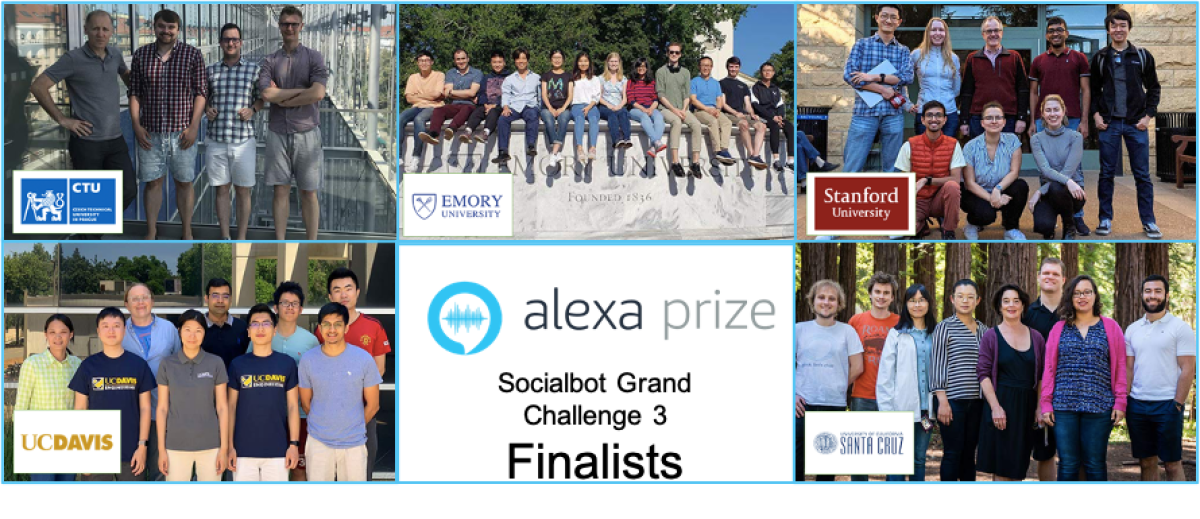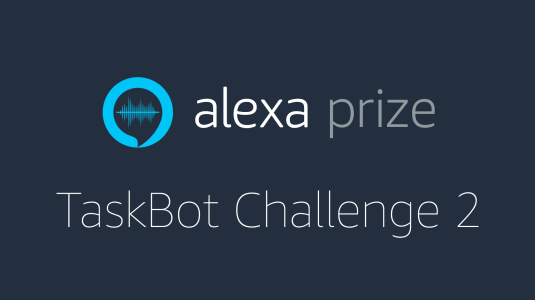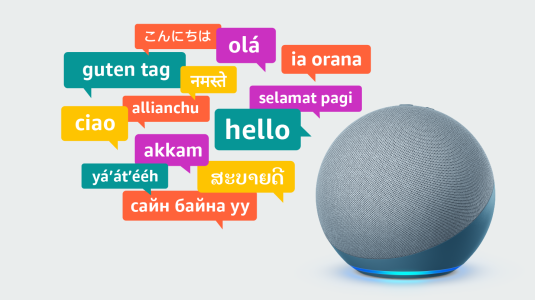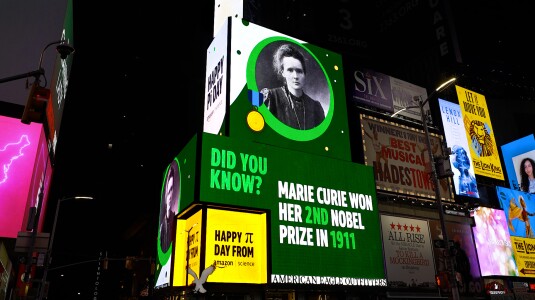Human beings are social creatures, and conversations are what connect us—they enable us to share everything from the prosaic to the profound with the people that matter to us. Living through an era marked by pandemic-induced isolation means many of those conversations have shifted online, but the connection they provide remains essential.
So what happens when you replace one of the human participants in a conversation with a socialbot? What does it mean to have an engaging conversation with an AI assistant? How can that kind of conversation prove to be valuable, and can it provide its own kind of connection?
Application period for next Alexa Prize challenge opens
The Amazon Alexa Prize team encourages all interested teams to apply for the Grand Challenge 4 by 11:59 p.m. PST on October 6, 2020.
The participants in this year’s Alexa Prize contest are driven by those questions. Amazon recently announced that a team from Emory University has won the 2020 Alexa Prize. We talked to that team, along with a judge from this year’s competition, as well as representatives from the other finalist teams at Czech Technical University, Stanford University, University of California, Davis, and University of California, Santa Cruz. We wanted to learn what drives them to participate, how COVID-19 has influenced their work and what they see as the possibilities and challenges for socialbots moving forward.
Q: What inspired you to participate in this year’s competition?
Sarah Fillwock, team leader, Emora, Emory University: We had a group of students who were interested in dialogue system research, some of whom had actually participated in the Alexa Prize in its previous years, and we all knew that the Alexa Prize offers a really unique opportunity for anyone interested in this type of work. It is really exciting to use the Alexa device platform to launch a socialbot, because we are able to get hundreds of conversations a day between our socialbot and human users, which really allows for quick turnaround time when assessing whether or not our hypotheses and strategies are improving the performance of our dialogue system.
Marilyn Walker, faculty advisor, Athena, University of California, Santa Cruz: In our Natural Language and Dialogue Systems lab, our main research focus is dialogue management and language generation. Conversational AI is a very challenging problem, and we felt like we could have a research impact in this area. The field has been developing extremely quickly recently, and the Alexa Prize offers an opportunity to try out cutting-edge technologies in dialogue management and language generation on a large Alexa user population.

Vrindavan (Davan) Harrison, team leader, Athena, UCSC: As academics, our primary focus is on research. This year’s competition aimed at being more research-oriented, allowing the teams to spend more time on developing new ideas.
Kai-Hui Liang, team lead, Gunrock, University of California, Davis: Our experience in last year’s competition motivated us to join again as we realized there is still a large room for improvement. I’m especially interested in how to find topics that engage users the most, including trying different ways to elicit and reason about users’ interests. How can we retrieve content that is relevant and interesting, and make the dialog flow more naturally?
Jan Pichl, team leader, Alquist, Czech Technical University: Since the first year of the Alexa Prize competition, we have been developing Alquist to deliver a wide range of topics with a closer focus on the most popular ones. The first Alquist guided a user through the conversation quite strictly. We learned quickly that we needed to introduce more flexibility and let the user be "in charge". With that in mind, we have been pushing Alquist in that direction. Moreover, we want Alquist to manage dialogue utilizing the knowledge graph, and suggest relevant information based on the previously discussed topics and entities.
Christopher D. Manning, faculty advisor, Chirpy Cardinal, Stanford University: It was our first time doing the Alexa Prize, and the team really hadn’t done advance preparation, so it’s all been a wild ride—by which I mean a lot of work and stress for everyone on the team. But it was super exciting that we were largely able to catch up with other leading teams who have been doing the competition for several years.
Hugh Howey, judge and science fiction author: Artificial intelligence is a passionate interest of mine. As a science fiction author, I have the freedom to write about most anything, but the one topic I keep coming back to is the impact that thinking machines already have on our lives and how that impact will only expand in the future. So any chance to be involved with those doing work and research in the field is a no-brainer for me. I leapt at the chance like a Boston Dynamics dog.
Q: What excites you about the potential of socialbots?
Hugh Howey (Judge): This technology will be transformative in ways we can barely comprehend. Right now, the human/computer interface is a bottleneck. It takes a long time for us to tell our computers what we want them to do, and they'll generally only do that thing the one time and forget what it learned. In the future, more and more of the trivial will be automated. This will free up human capital to tackle larger problems. It will also bring us together by removing language barriers, by helping those with disabilities, and eventually this technology will be available to anyone who needs it.
Jinho D. Choi, faculty advisor, Emory: It has been reported that more than 44 million adults in US have mental health issues such as anxiety or depression. We believe that developing an innovative socialbot that comforts people can really help those with mental health conditions, who are generally afraid of talking to other human beings. You may wonder how artificial intelligence can convey a human emotion such as caring. However, humans have used their own creations, such as arts and music, to comfort themselves. It is our vision to advance AI, the greatest invention of humankind, to help individuals learn more about their inner selves so they can feel more positive about themselves, and have a bigger impact in the world.
Ashwin Paranjape, co-team leader, Stanford: As socialbots become more sophisticated and prevalent, increasing numbers of people are chatting with them regularly. As the name suggests, socialbots have the potential to fulfill social needs, such as chit-chatting about everyday life, or providing support to a person struggling with mental health difficulties. Furthermore, socialbots could become a primary user interface through which we engage with the world—for example, chatting about the news, or discussing a book.
Sarah Fillwock, Emory: Our experience in this competition has really solidified this idea of the potential of socialbots being value to people who need support and are in troubling situations. I think that the most compelling role for socialbots in global challenges is to provide a supportive environment to allow people to express themselves, and explore their feelings with regard to whatever dramatic event is going on. This is especially important for vulnerable populations, such as those who do not have a strong social circle or have reduced social contact with others, prohibiting them from being able to achieve the feeling of being valued and understood.
Q: What are the main challenges to realizing that potential?
Abigail See, co-team leader, Stanford: Currently, socialbots struggle to make sense of long, involved conversations, and this limits their ability to talk about any topic in depth. To do this better, socialbots will need to understand what a particular user wants—not only in terms of discussion topics, but also what kind of conversation they want to have. Another important challenge is to allow users to take more initiative, and drive the conversation themselves. Currently, socialbots tend to take more initiative, to ensure the conversation stays within their capabilities. If we can make our socialbots more flexible, they will be much more useful and engaging to people.
Sarah Fillwock, Emory: One major challenge facing the field of dialogue system research is establishing a best practice for evaluation of the performance of dialogue approaches. There is currently a diverse set of evaluation strategies that the research community uses to determine how well their new dialogue approach performs. Another challenge is that dialogues are more than just a pattern-matching problem. Having a back-and-forth dialogue on any topic with another agent tends to involve planning towards achieving specific goals during the conversation as new information about your speaking partner is revealed. Dialogues also rely a lot on having a foundation of general world knowledge that you use to fully understand the implications of what the other person is saying.
Amazon releases Topical Chat dataset
The text-based collection of more than 235,000 utterances will help support high-quality, repeatable research in the field of dialogue systems.
Marilyn Walker, UCSC: There’s a shortage of large annotated conversational corpora for the task of open-domain conversation. For example, progress in NLU has been supported by large annotated corpora, such as Penn Treebank, however, there are currently no such publicly available corpora for open-domain conversation. Also, a rich model of individual users would enable much more natural conversations, but privacy issues currently make it difficult to build such models.
Hugh Howey (Judge): The challenge will be for our ethics and morality to keep up with our gizmos. We will be far more powerful in the future. I only hope we'll be more responsible as well.
Q: What role has the COVID-19 pandemic played in your work?
Jurik Juraska, team member, UCSC: The most immediate effect the onset of the pandemic had on our socialbot was, of course, that it could not just ignore this new dynamic situation. Our socialbot had to acknowledge this new development, as that was what most people were talking about at that point. We would thus have Athena bring up the topic at the beginning of the conversation, sympathizing with the users' current situation, but avoiding wallowing in the negative aspects of it. In the feedback that some users left, there were a number of expressions of gratitude for the ability to have a fun interaction with a socialbot at a time when direct social interaction with friends and family was greatly restricted.
Kai-Hui Liang, UC Davis: We noticed an evident difference in the way Alexa users reacted to popular topics. For example, before COVID-19, many users gave engaging responses when discussing their favorite sports to watch, their travel experiences, or events they plan to do over the weekend. After the breakout of COVID-19, more users replied saying there’s no sports game to watch or they are not able to travel. Therefore, we adapted our topics to better fit the situation. We added discussion about their life experience during the quarantine (eg. how their diet has changed or if they walk outside daily to stay healthy). We also observed more users having negative feelings potentially due to the quarantine. For instance, some users said they feel lonely and they miss their friends or family. Therefore, we enhanced our comforting module that expresses empathy through active listening.
Abigail See, Stanford: As the pandemic unfolded, we saw in real time how users changed their expectations of our socialbot. Not only did they want our bot to deliver up-to-date information, they also wanted it to show emotional understanding for the situation they were in.
Sarah Fillwock, Emory: When COVID became a significant societal issue, we tried two things: we had an experience-oriented COVID topic where our bot discussed with people how they felt about COVID in a sympathetic and reassuring atmosphere, and we had a fact-oriented COVID topic that gave objective information. What we observed was that people had a much stronger positive reaction to the experience-oriented COVID-19 approach than the fact-oriented COVID-19 approach, and seemed to prefer it when talking. This really gave us some empirical evidence that social agents have a strong potential to be helpful in times of turmoil by giving people a safe and caring space to talk about these major events in their life since people responded positively to our approach at doing this.
Q: Lastly, are there any particular advancements in the fields of NLU, dialogue management, conversational AI, etc., that you find promising?
Jan Pichl, Czech Technical University: It is exciting to see the capabilities of the Transformer-based models these days. They are able to generate large articles or even whole stories that are coherent. However, they demand a lot of computation power during the training phase and even during the runtime. Additionally, it is still challenging to use them in a socialbot when you need to work with constantly changing information about the world.
Abigail See, Stanford: As NLP researchers, we are amazed by the incredible pace of progress in the field. Since the last Alexa Prize in 2018, there have been game-changing advancements, particularly in the use of large pretrained language models to understand and generate language. The Alexa Prize offers a unique opportunity for us to apply these techniques, which so far have mostly been tested only on neat, well-defined tasks, and put them in front of real people, with all the messiness that entails! In particular, we were excited to explore the possibility of using neural generative models to chat with people. As recently as the 2018 Alexa Prize, these models generally performed poorly, and so were not used by any of the finalist teams. However, this year, these systems became an important backbone of our system.
Sarah Fillwock, Emory: The work people have been putting into incorporating common sense knowledge and common sense reasoning into dialogue systems is one of the most interesting directions of the current conversational AI field. A lot of the common sense knowledge we use is not explicitly detailed in any type of data set as people have learned them through physical experience or inference over time, so there isn’t necessarily any convenient way to currently accomplish this goal. There have been a lot of attempts to see how far a language modeling approach to dialogue agents can go, but even using huge dialogue data sets and highly complex models still results in hit-and-miss success at common sense information. I am really looking forward to the dialogue approaches and dialogue resources that more explicitly try to model this type of common sense knowledge.




